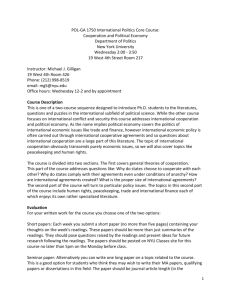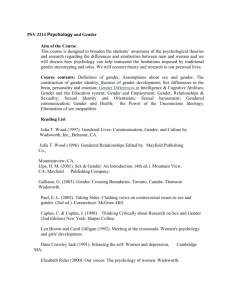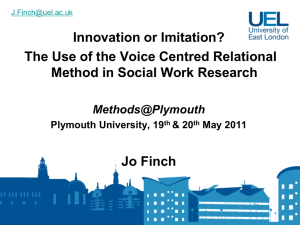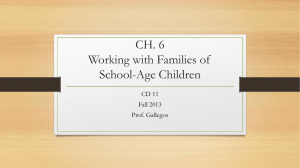Read List-
advertisement
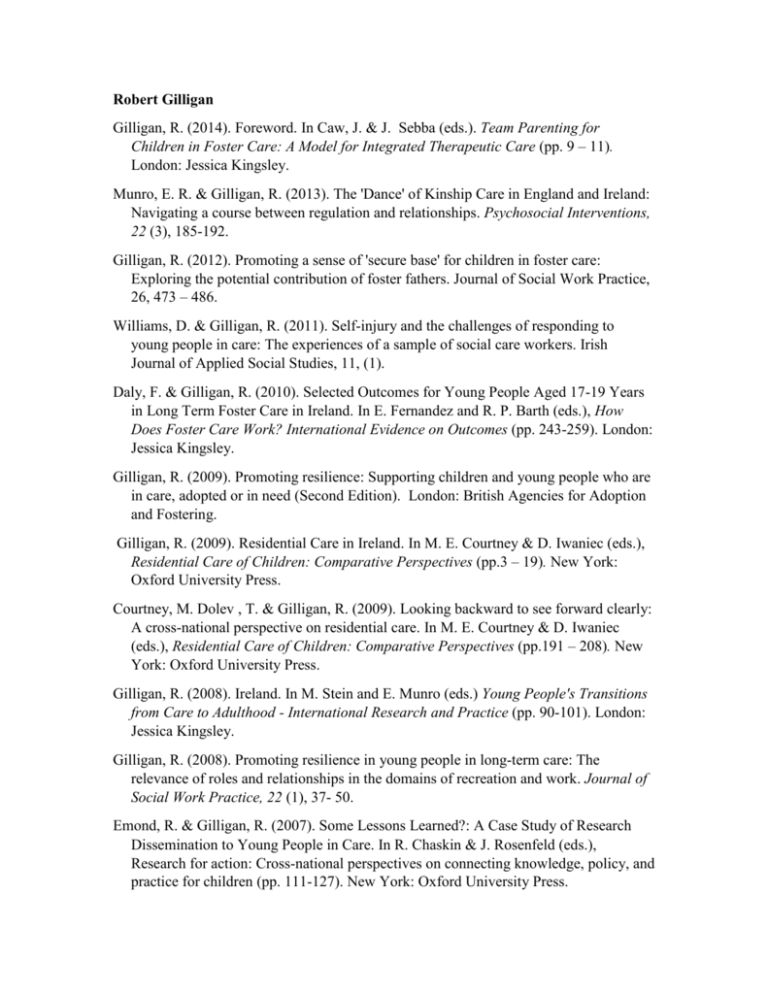
Robert Gilligan Gilligan, R. (2014). Foreword. In Caw, J. & J. Sebba (eds.). Team Parenting for Children in Foster Care: A Model for Integrated Therapeutic Care (pp. 9 – 11). London: Jessica Kingsley. Munro, E. R. & Gilligan, R. (2013). The 'Dance' of Kinship Care in England and Ireland: Navigating a course between regulation and relationships. Psychosocial Interventions, 22 (3), 185-192. Gilligan, R. (2012). Promoting a sense of 'secure base' for children in foster care: Exploring the potential contribution of foster fathers. Journal of Social Work Practice, 26, 473 – 486. Williams, D. & Gilligan, R. (2011). Self-injury and the challenges of responding to young people in care: The experiences of a sample of social care workers. Irish Journal of Applied Social Studies, 11, (1). Daly, F. & Gilligan, R. (2010). Selected Outcomes for Young People Aged 17-19 Years in Long Term Foster Care in Ireland. In E. Fernandez and R. P. Barth (eds.), How Does Foster Care Work? International Evidence on Outcomes (pp. 243-259). London: Jessica Kingsley. Gilligan, R. (2009). Promoting resilience: Supporting children and young people who are in care, adopted or in need (Second Edition). London: British Agencies for Adoption and Fostering. Gilligan, R. (2009). Residential Care in Ireland. In M. E. Courtney & D. Iwaniec (eds.), Residential Care of Children: Comparative Perspectives (pp.3 – 19). New York: Oxford University Press. Courtney, M. Dolev , T. & Gilligan, R. (2009). Looking backward to see forward clearly: A cross-national perspective on residential care. In M. E. Courtney & D. Iwaniec (eds.), Residential Care of Children: Comparative Perspectives (pp.191 – 208). New York: Oxford University Press. Gilligan, R. (2008). Ireland. In M. Stein and E. Munro (eds.) Young People's Transitions from Care to Adulthood - International Research and Practice (pp. 90-101). London: Jessica Kingsley. Gilligan, R. (2008). Promoting resilience in young people in long-term care: The relevance of roles and relationships in the domains of recreation and work. Journal of Social Work Practice, 22 (1), 37- 50. Emond, R. & Gilligan, R. (2007). Some Lessons Learned?: A Case Study of Research Dissemination to Young People in Care. In R. Chaskin & J. Rosenfeld (eds.), Research for action: Cross-national perspectives on connecting knowledge, policy, and practice for children (pp. 111-127). New York: Oxford University Press. Gilligan, R. (2007). Adversity, Resilience and the Educational Progress of Young People in Public Care. Emotional and Behavioural Difficulties, 12, (2), 135 – 145. Gilligan, R. (2007). Spare time activities for young people in care: What can they contribute to educational progress? , Adoption and Fostering, 31, 92 – 99. Gilligan, R. (2006). Promoting Resilience and Permanence in Child Welfare. In, J. Barber, P. Dudding & R. Flynn (eds.), Promoting resilient development in children receiving care (pp.18 – 33). Ottawa: University of Ottawa Press. Keogh, A.F., Halpenny, A.M. & Gilligan , R. CEducational issues for children and young people in families living in emergency accommodation: An Irish perspective , Children and Society, 20(5), 360 – 375. R. Gilligan (2006). Creating a warm place where children can blossom. Social Policy Journal of New Zealand – Te Puna Whakaaro, 28, 36 – 45. Daly, F. & Gilligan, R. (2005). Lives in foster care: The educational and social support experiences of young people aged 13 - 14 years in long-term foster care. Dublin: Children's Research Centre. Gilligan, R. (2005). Resilience and residential care for children and young people. In D. Crimmens, & I. Milligan (eds.), Facing forward: Residential child care in the 21st century (pp.105 – 113). Lyme Regis: Russell House Publishing. Gilligan, R. & Daly, F. (2005). Selected aspects of education and contact with birth family amongst young people aged 13-14 years in long term foster care in Ireland. In H. Grietens, W. Lahaye, W. Hellinckx & L. Vandemeulebroecke (Eds.) In the Best Interests of Children and Youth. Leuven: Leuven University Press. Gilligan, R. (2005). Enhancing the resilience of children and young people in public care by mentoring their talents and interests. In N. Frost (Ed.), Child Welfare- Major Themes in Health and Social Welfare, Volume III, Child Placement and Children Away from Home (pp. 189 – 204). London: Routledge. Halpenny, A. M. & Gilligan, R. (2004). Caring Before Their Time? Research and Policy Perspectives on Young Carers. Dublin: The National Children's Resource Centre, Barnardos and The Children's Research Centre. Gilligan, R. (2001). Promoting resilience: A resource guide on working with children in the care system. London: British Agencies for Adoption and Fostering. Kelly, G. & Gilligan R. (eds) (2000). Issues in Foster Care. London: Jessica Kingsley. Gilligan, R. (2000). The importance of listening to the child in foster care. In G. Kelly & R. Gilligan (Eds.), Issues in Foster Care (pp. 40 – 58). London: Jessica Kingsley. Gilligan, R. (2000). Men as foster carers: A neglected resource? Adoption and Fostering , 24 (2), 63 – 69. Gilligan, R. (2000). The key role of social workers in promoting the well-being of children in state care: A neglected dimension of reforming policies. Children and Society, 14, 267 – 276. Gilligan, R. (2000). The developmental implications for children of life in public care – Irish and international perspectives. Irish Journal of Psychology, 21, 138 – 153 Daniel, B., Wassell, S., & Gilligan, R. (1999). Child Development for Child Care and Protection Workers. London: Jessica Kingsley. Gilligan, R. (1999). Enhancing the resilience of children and young people in public care by encouraging their talents and interests. Child and Family Social Work , 4, (3), 187 – 196. Gilligan, R. (1998). Beyond permanence? - The importance of resilience in child placement practice and planning. In M. Hill & M. Shaw (Eds.) Signposts to Adoption: Policy, practice and research issues (pp. 80 - 96). London: British Agencies for Adoption and Fostering. Gilligan, R. (1996). The foster carer experience in Ireland – Findings from a postal survey, Child: Care, Health and Development, 22, 85 – 98.

